完整版新概念英语第二册学生用书Lesson21
- 格式:doc
- 大小:19.40 KB
- 文档页数:4

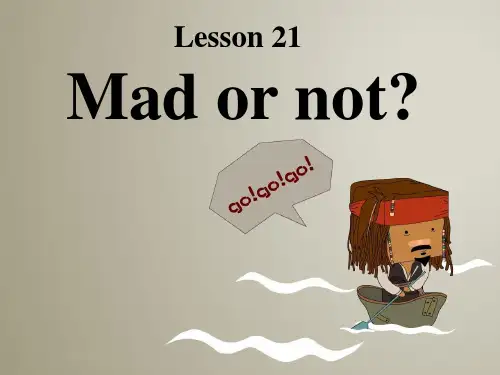
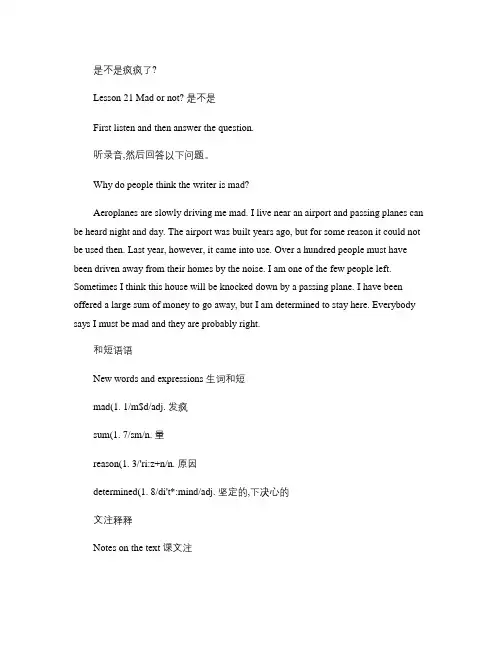
是不是疯疯了?Lesson 21 Mad or not? 是不是First listen and then answer the question.听录音,然后回答以下问题。
Why do people think the writer is mad?Aeroplanes are slowly driving me mad. I live near an airport and passing planes can be heard night and day. The airport was built years ago, but for some reason it could not be used then. Last year, however, it came into use. Over a hundred people must have been driven away from their homes by the noise. I am one of the few people left. Sometimes I think this house will be knocked down by a passing plane. I have been offered a large sum of money to go away, but I am determined to stay here. Everybody says I must be mad and they are probably right.和短语语New words and expressions 生词和短mad(1. 1/m$d/adj. 发疯sum(1. 7/sm/n. 量reason(1. 3/'ri:z+n/n. 原因determined(1. 8/di't*:mind/adj. 坚定的,下决心的文注释释Notes on the text 课文注1 Aeroplanes are slowly driving me mad.飞机正在逐渐把我逼疯。
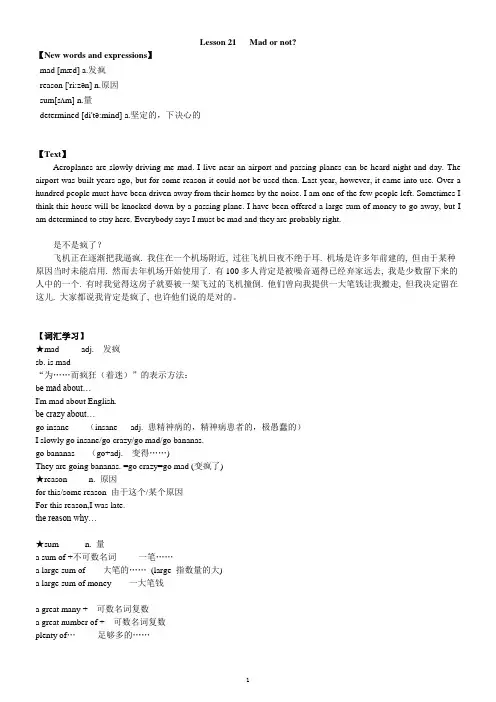
Lesson 21 Mad or not?【New words and expressions】mad [mæd] a.发疯reason ['ri:zən] n.原因sum[sʌm] n.量determined [di'tə:mind] a.坚定的,下决心的【Text】Aeroplanes are slowly driving me mad. I live near an airport and passing planes can be heard night and day. The airport was built years ago, but for some reason it could not be used then. Last year, however, it came into use. Over a hundred people must have been driven away from their homes by the noise. I am one of the few people left. Sometimes I think this house will be knocked down by a passing plane. I have been offered a large sum of money to go away, but I am determined to stay here. Everybody says I must be mad and they are probably right.是不是疯了?飞机正在逐渐把我逼疯. 我住在一个机场附近, 过往飞机日夜不绝于耳. 机场是许多年前建的, 但由于某种原因当时未能启用. 然而去年机场开始使用了. 有100多人肯定是被噪音逼得已经弃家远去, 我是少数留下来的人中的一个. 有时我觉得这房子就要被一架飞过的飞机撞倒. 他们曾向我提供一大笔钱让我搬走, 但我决定留在这儿. 大家都说我肯定是疯了, 也许他们说的是对的。
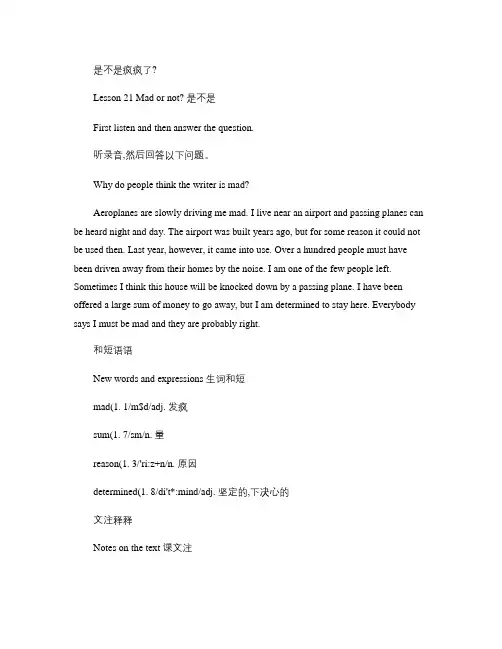
是不是疯疯了?Lesson 21 Mad or not? 是不是First listen and then answer the question.听录音,然后回答以下问题。
Why do people think the writer is mad?Aeroplanes are slowly driving me mad. I live near an airport and passing planes can be heard night and day. The airport was built years ago, but for some reason it could not be used then. Last year, however, it came into use. Over a hundred people must have been driven away from their homes by the noise. I am one of the few people left. Sometimes I think this house will be knocked down by a passing plane. I have been offered a large sum of money to go away, but I am determined to stay here. Everybody says I must be mad and they are probably right.和短语语New words and expressions 生词和短mad(1. 1/m$d/adj. 发疯sum(1. 7/sm/n. 量reason(1. 3/'ri:z+n/n. 原因determined(1. 8/di't*:mind/adj. 坚定的,下决心的文注释释Notes on the text 课文注1 Aeroplanes are slowly driving me mad.飞机正在逐渐把我逼疯。
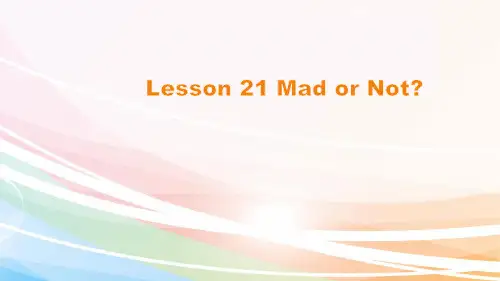

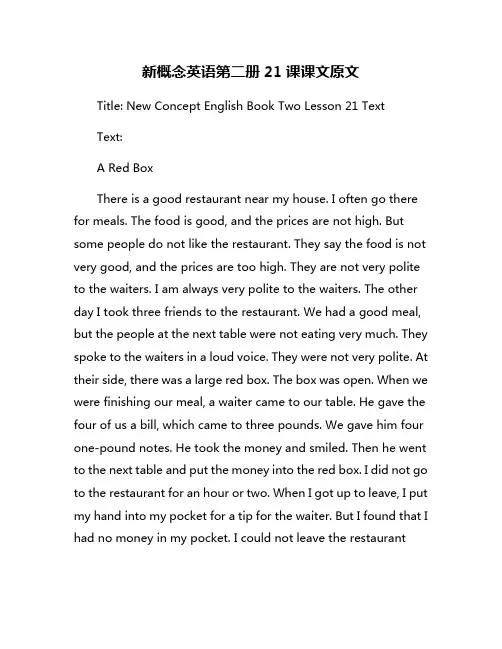
新概念英语第二册21课课文原文Title: New Concept English Book Two Lesson 21 TextText:A Red BoxThere is a good restaurant near my house. I often go there for meals. The food is good, and the prices are not high. But some people do not like the restaurant. They say the food is not very good, and the prices are too high. They are not very polite to the waiters. I am always very polite to the waiters. The other day I took three friends to the restaurant. We had a good meal, but the people at the next table were not eating very much. They spoke to the waiters in a loud voice. They were not very polite. At their side, there was a large red box. The box was open. When we were finishing our meal, a waiter came to our table. He gave the four of us a bill, which came to three pounds. We gave him four one-pound notes. He took the money and smiled. Then he went to the next table and put the money into the red box. I did not go to the restaurant for an hour or two. When I got up to leave, I put my hand into my pocket for a tip for the waiter. But I found that I had no money in my pocket. I could not leave the restaurantwithout giving the waiter a tip. So I took a piece of paper and wrote on it: 'You are very polite'. Then I put this into the red box.Word Count: 212End of Text.。
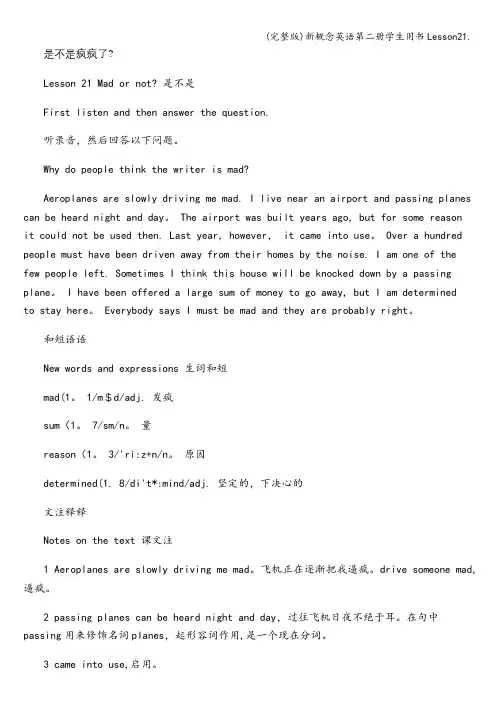
是不是疯疯了?Lesson 21 Mad or not? 是不是First listen and then answer the question.听录音,然后回答以下问题。
Why do people think the writer is mad?Aeroplanes are slowly driving me mad. I live near an airport and passing planes can be heard night and day。
The airport was built years ago, but for some reason it could not be used then. Last year, however, it came into use。
Over a hundred people must have been driven away from their homes by the noise. I am one of the few people left. Sometimes I think this house will be knocked down by a passing plane。
I have been offered a large sum of money to go away, but I am determinedto stay here。
Everybody says I must be mad and they are probably right。
和短语语New words and expressions 生词和短mad(1。
1/m$d/adj. 发疯sum(1。
7/sm/n。
量reason(1。
3/'ri:z+n/n。
原因determined(1. 8/di't*:mind/adj. 坚定的,下决心的文注释释Notes on the text 课文注1 Aeroplanes are slowly driving me mad。
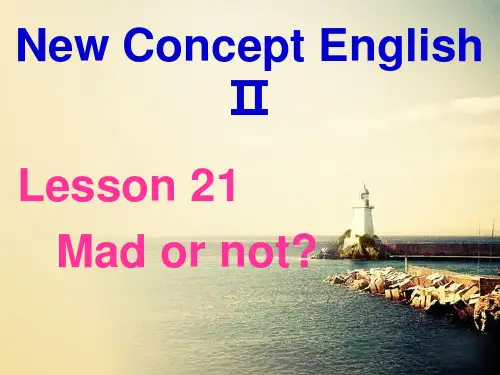
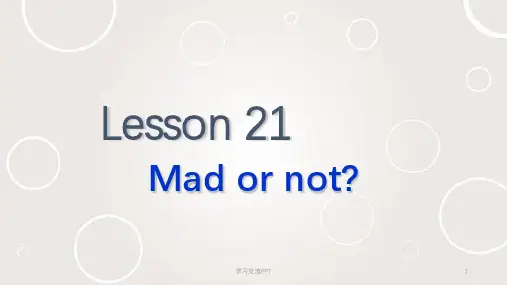
新概念英语第二册21课文原文Title: Mad or Not.I live near an airport where planes take off and land all day and all night. This airport was built many years ago, but for some reason, it could not be used then. However, it began operating last year. More than a hundred people who lived near the airport have been driven away by the noise, and I am one of the few people who have decided to stay. Sometimes I think the house will be knocked down by a passing plane. The people from the airport have offered me a large amount of money to go away, but I have refused. Everyone says I must be mad and perhaps they are right.Last week, a woman who lives in a house not far from mine was killed when a plane came down and crashed into her house. I know I should have left long ago, but I am determined to stay. I have made my home here, and I refuse to leave it. I sleep with my windows open, even though thenoise is terrible. I tell myself that it is only the sound of freedom.Some nights, I wake up with a start, thinking a plane is crashing into my house. Then I realize it is only the sound of a plane taking off or landing. I lie in bed and listen to the noise, and I know that I am not mad. I am simply living with the noise, and I have chosen to do so.I have learned to ignore the noise most of the time, but sometimes it still gets to me. I find it difficult to concentrate on my work, and I often have to stop and listen to make sure a plane is not crashing into my house. But I refuse to let the noise rule my life.I know that some people think I am crazy to stay here, but I am not the only one. There are others who have chosen to stay, and we support each other. We have formed a group called "Friends of the Airport," and we meet regularly to talk about our problems and to share our experiences.We have even started a petition to try to get theairport to reduce the noise. We know it will be difficult, but we are determined to try. We believe that we have a right to live in peace in our own homes, and we are not going to give up without a fight.In the meantime, we have found ways to cope with the noise. Some of us wear earplugs at night, and others use white noise machines to help us sleep. We have even started a garden where we can sit and relax in the fresh air, far away from the noise of the airport.So, am I mad? Perhaps some people think so, but I know in my heart that I am not. I have chosen to stay here, and I am determined to make the best of it. I may not be able to消除 the noise, but I can control my reaction to it. And that, I believe, is what really matters.This experience has taught me that we can all cope with difficult situations if we are determined enough. We may not be able to change our environment, but we can change our attitude towards it. And that, in the end, is what really counts. So, whether you think I am mad or not, I amcontent with my choice, and I am determined to make the most of it.。
新概念英语第二册第21课Lesson 21 Getting energy from the sunThe sun is the source of all energy on Earth. Plants use sunlight to make food through a process called photosynthesis. This food is then transferred to animals when they eat plants. In this way, energy from the sun is passed on through the food chain.Solar panels are devices that can directly convert sunlight into electricity. They consist of many small units called photovoltaic cells. When sunlight shines on these cells, they produce an electric current. Solar panels are becoming increasingly popular as a renewable energy source because they do not release any harmful pollutants.Solar power is used in various ways. It can be used to heat water or even to power entire buildings. Some countries are investing heavily in solar power as a way to reduce their dependence on fossil fuels and decrease greenhouse gas emissions.Another way to harness solar energy is through solar thermal systems. These systems use mirrors to reflect sunlight onto a receiver, which then converts the heat into usable energy. Solar thermal systems are used to heat water, generate electricity, and even provide heating for homes.Overall, solar energy is a clean and sustainable source of energy. By harnessing the power of the sun, we can reduce our impact on the environment and create a more sustainable future.。
新概念第二册第21课课文一、课文翻译1、课文原文Aeons ago, or so it seems, I bought a beautiful pony named Pinkle. She was beautiful, pink-nosed and with a shiny coat. She had bought me a beautiful pony named Pinkle. I had bought her a beautiful pony named Pinkle, too. I had bought her for my wife, as a surprise birthday present. However, she had bought me a beautiful pony named Pinkle as well!很久以前,似乎是这样,我买了一匹漂亮的小马,名叫平克尔。
它很漂亮,鼻子是粉红色的,皮毛闪着光。
它也给我买了一匹漂亮的小马,也叫平克尔。
我也给我妻子买了一匹漂亮的小马,也叫平克尔,作为生日惊喜。
然而,她也给我买了一匹漂亮的小马,也叫平克尔!2、课文翻译很久以前,我买了一匹非常漂亮的小马,名叫平克尔。
这匹马有着粉红色的鼻子和闪亮的皮毛。
我买这匹马是作为给我妻子的生日惊喜。
然而,让人意想不到的是,我妻子也给我买了一匹同样漂亮的小马,也叫平克尔!二、学习笔记1、重点词汇和短语(1) aeons ago:很久以前(2) pink-nosed:鼻子是粉红色的(3) shiny coat:闪亮的皮毛(4) birthday present:生日礼物2、语法和句型(1) 本文主要讲述了过去发生的一件事情,因此使用了过去时态。
例如,“I bought a beautiful pony”和“she had bought me a beautiful pony”。
(2) 文章中出现了多次重复的结构和词汇,如“a beautiful pony named Pinkle”,这种重复可以增强文章的节奏感和幽默感。
是不是疯疯了?Lesson 21 Mad or not? 是不是First listen and then answer the question.听录音,然后回答以下问题。
Why do people think the writer is mad?Aeroplanes are slowly driving me mad. I live near an airport and passing planes can be heard night and day. The airport was built years ago, but for some reason it could notbe used then. Last year, however, it came into use. Over a hundred people must have been driven away from their homes by the noise. I am one of the few people left. Sometimes I think this house will be knocked down by a passing plane. I have been offered a large sum of money to go away, but I am determined to stay here. Everybodysays I must be mad and they are probably right.和短语语New words and expressions 生词和短mad(1. 1/m$d/adj. 发疯sum(1. 7/sm/n. 量reason(1. 3/'ri:z+n/n. 原因determined(1. 8/di't*:mind/adj. 坚定的,下决心的文注释释课文注Notes on the text1 Aeroplanes are slowly driving me mad.飞机正在逐渐把我逼疯。
drive someone mad,逼疯。
2 passing planes can be heard night and day,过往飞机日夜不绝于耳。
在句中passing 用来修饰名词planes,起形容词作用,是一个现在分词。
3 came into use,启用。
4 Over a hundred people must have been driven away from their homes by the noise.有100多人肯定是被噪音逼得离家远去。
情态动词must+完成时态,是对过去事情的推测,猜测某一事情肯定已经发生。
drive away,赶走,逼走。
参考译文飞机正在逐渐把我逼疯。
我住在一个机场附近,过往飞机日夜不绝于耳。
机场是许多年前建的,但由于某种原因当时未能启用。
然而去年机场开始使用了。
有100多人肯定是被噪音逼得已经弃家远去,我是少数留下来的人中的一个。
有时我觉得这房子就要被一架飞过的飞机撞倒。
他们曾向我提供一大笔钱让我搬走,但我决定留在这儿。
大家都说我肯定是疯了,也许他们说的是对的。
摘要写写作Summary writing 摘要Answer these questions in not more than 50 words.回答下列问题,将答案组成一个段落,不要超过50个单词。
1 Is the writer slowly going mad or not?2 Where does he live?3 What can be heard night and day?4 Have most of his neighbours left their homes or not?5 Has he been offered money to leave or not?6 What is he determined to do?7 What does everyone say?8 Are they probably right or wrong?句型关键句型Key structures关键句型Passing planes can be heard night and day. 被动语态(KS10 (参见第10课关键句型a Read these pairs of sentences carefully. The first sentence in each pair tells us about a person (Who. The second tells us about a thing (What or Which.仔细阅读以下句子,每一对中的第1句以人为主(谁,第2句以物品为主(什么,哪一件。
He will repair your watch. (Who 他会修理你的表。
Your watch will be repaired. (What 你的表会修好的。
He can repair your watch. (Who 他能修你的表。
你的表能修好。
Your watch can be repaired. (WhatThey must test this new car. (Who 他们必须试试这辆新车。
This new car must be tested. (What 这辆新车必须试一试。
You have to write this letter again. (Who 你必须重写这封信。
This letter has to be written again. (What 这封信必须重写。
I told you he could do it. (Who 我告诉你他能做。
I told you it could be done. (What 我告诉你这件事能做。
I told you he would do it. (Who 我告诉你他会做这件事。
I told you it would be done. (What 我告诉你这件事会干好的。
I can't find my bag. Someone has stolen it. (Who 我找不到我的提包。
有人偷走了。
I can't find my bag. It has been stolen. (What 我找不到我的提包。
它被偷走了。
I can't find my bag. Someone must have stolen it. (Who 我找不到我的提包。
有人肯定把它偷走了。
I can't find my bag. It must have been stolen. (What 我找不到我的提包。
它肯定被人偷走了。
Exercises 练习练习A There are some verbs in the passage which are like the examples given above.Can you find them?找出课文中所有被动语的例子。
B Change the form of the phrases in italics. Do not refer to the passage until you finish the exercise.完成练习后再对照课文核对你的答案。
,将斜体印出的部分改写成被动语态.b Instead of saying: We can say:除了这种表述方法外: 还可以说The police will arrest the thieves. The thieves will be arrested (bythe police.You must pay me for this.I must be paid for this.They cannot find him. He cannot be found.I live near an airport and I can hear passing planes night and day. They built the airport years ago, but for some reason they could not use it then. Last year, however, it came into use. The noise must have driven over a hundred people away from their homes.I am one of the few people left. Sometimes I think a passing plane will knock down thishouse. They have offered me a large sum of money to go away, but I am determined tostay here.C Change the form of these sentences. Your sentences must begin with the words in italics.改写以下句子,将斜体印出的词和词组作主语。
1 I will send a message immediately.2 We must sell all these goods.3 I told you he would receive the parcel in time.4 He has to deliver the letter by hand.5 They must have lost your letter in the post.Special difficulties难点Words often confused and misused经常容易混淆和误用的词Study these examples:细读以下例句:a Drive. This verb can be used in many ways. 这个动词的词义很多Aeroplanes are slowly driving me mad. (1. 1He drives his car very badly. 他开车开得很糟糕。
The farmer drove the cattle into the field. 农夫把牛赶进田里。
Our army drove the enemy back. 我们的军队把敌人撵了回去。
During the war, many people were driven out of their homes. 战争期间,许多人被赶出了家园。